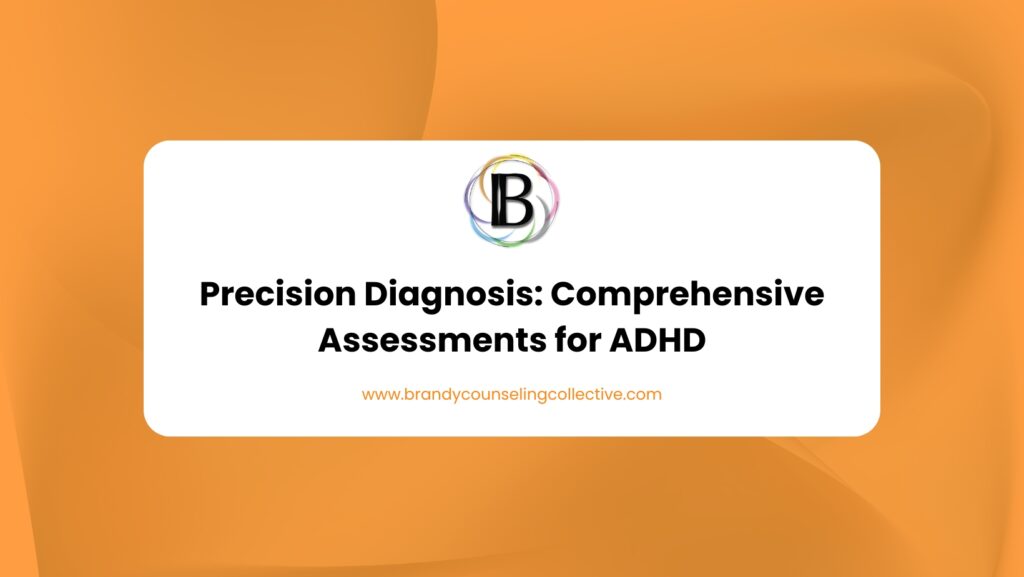Attention Deficit Hyperactivity Disorder (ADHD) is a common neurodevelopmental disorder that affects children and adults, characterized by symptoms of inattention, hyperactivity, and impulsivity. Accurate and comprehensive assessments are essential for diagnosing ADHD and developing effective intervention strategies. This blog delves into the importance of precise diagnosis, the components of a comprehensive ADHD assessment, and the benefits it brings to individuals affected by ADHD.
Understanding ADHD
ADHD is a multifaceted disorder that can significantly impact an individual’s daily life, affecting academic performance, work productivity, and interpersonal relationships. The symptoms of ADHD are categorized into two primary types: inattention and hyperactivity-impulsivity. While some individuals may predominantly exhibit symptoms of one type, others may display a combination of both.
Symptoms of Inattention
- Difficulty sustaining attention in tasks or play activities
- Frequent careless mistakes in schoolwork or work tasks
- Difficulty organizing tasks and activities
- Avoidance of tasks requiring sustained mental effort
- Frequently losing items necessary for tasks or activities
- Easily distracted by extraneous stimuli
- Forgetfulness in daily activities
Symptoms of Hyperactivity-Impulsivity
- Fidgeting with hands or feet or squirming in seat
- Inability to remain seated in situations where it is expected
- Running or climbing in inappropriate situations
- Difficulty playing or engaging in activities quietly
- Talking excessively
- Interrupting or intruding on others’ conversations or games
- Difficulty waiting for their turn
Importance of Comprehensive Assessments
Accurate diagnosis of ADHD is crucial for effective treatment and ADHD management. Comprehensive assessments ensure that the ADHD diagnosis is based on a thorough understanding of the individual’s behavior, cognitive function, and developmental history. Here are some reasons why comprehensive assessments are vital:
Tailored Interventions
Each individual with ADHD is unique, with distinct strengths and challenges. Comprehensive assessments provide detailed information that helps in developing personalized intervention plans, maximizing the effectiveness of treatments and supports.
Identification of Co-occurring Conditions
ADHD often co-occurs with other conditions such as anxiety, depression, learning disabilities, and behavioral disorders. Comprehensive assessments help identify these co-occurring conditions, ensuring that all aspects of the individual’s needs are addressed.
Long-term Planning
Understanding the full scope of an individual’s ADHD symptoms and related challenges aids in long-term planning. This includes educational accommodations, workplace adjustments, and therapeutic interventions that can evolve as the individual grows and their needs change.
Components of a Comprehensive ADHD Assessment
A comprehensive ADHD assessment involves multiple steps and tools to gather detailed information about the individual’s behavior, development, and functioning. Here are the key components of a thorough ADHD assessment:
1. Clinical Interviews
Clinical interviews with the individual and their family members are foundational to the assessment process. These interviews help gather information about the individual’s developmental history, family history, and current functioning. They provide insight into how ADHD symptoms manifest across different settings and over time.
2. Behavior Rating Scales
Behavior rating scales are standardized tools used to quantify the severity and frequency of ADHD symptoms. These scales are completed by parents, teachers, and sometimes the individuals themselves. Commonly used behavior rating scales include:
- Conners’ Rating Scales: These scales assess ADHD symptoms and related behaviors in children and adolescents.
- Adult ADHD Self-Report Scale (ASRS): This scale is used for assessing ADHD symptoms in adults.
3. Observational Assessments
Observational assessments involve directly observing the individual’s behavior in various settings, such as home, school, or the workplace. These observations help professionals understand how ADHD symptoms impact daily functioning and identify specific environmental triggers or supports.
4. Cognitive and Neuropsychological Testing
Cognitive and neuropsychological testing evaluates the individual’s cognitive abilities, such as attention, memory, executive functioning, and processing speed. These tests help identify specific areas of cognitive strength and weakness, guiding the development of targeted interventions.
5. Educational and Academic Assessments
For children and adolescents, educational assessments are crucial for understanding how ADHD impacts academic performance. These assessments evaluate skills such as reading, writing, mathematics, and overall learning potential. They help in developing appropriate educational accommodations and support plans.
6. Medical and Psychological Evaluations
A comprehensive ADHD assessment often includes medical and psychological evaluations to rule out other conditions that might mimic or exacerbate ADHD symptoms. These evaluations can include physical examinations, medical history reviews, and assessments for co-occurring psychological conditions like anxiety or depression.
7. Self-Report Questionnaires
Self-report questionnaires allow individuals to describe their own experiences and perceptions of their symptoms. These questionnaires provide valuable insight into how ADHD affects their daily life and well-being.
The ADHD Assessment Process
A comprehensive ADHD assessment involves a multidisciplinary team of professionals, including psychologists, psychiatrists, pediatricians, and educators. The assessment process typically follows these steps:
Step 1: Initial Consultation
The assessment process begins with an initial consultation with a healthcare provider or specialist. During this meeting, parents, caregivers, or the individual share their concerns and observations about behavior and development.
Step 2: Gathering Information
The healthcare provider gathers detailed information through clinical interviews, behavior rating scales, and questionnaires. This information helps create a comprehensive picture of the individual’s symptoms and challenges.
Step 3: Conducting Assessments
The multidisciplinary team conducts a series of assessments, including cognitive and neuropsychological testing, observational assessments, and educational evaluations. Each team member evaluates the individual in their area of expertise, contributing to a holistic understanding of the individual’s strengths and challenges.
Step 4: Feedback and Diagnosis
After completing the assessments, the team meets to discuss their findings and make a diagnosis. They then provide feedback to the individual and their family, explaining the results and the implications for the individual’s development and functioning. This feedback includes detailed discussions about the ADHD diagnosis, the primary care needed, and the potential treatment options.
Step 5: Developing an Intervention Plan
Based on the assessment results, the team develops an individualized intervention plan tailored to the individual’s needs. This plan may include recommendations for therapies, educational supports, and other interventions to address specific challenges. Effective ADHD management often involves a combination of behavioral therapies and medication, considering potential side effects and the individual’s response to treatment.
Benefits of Comprehensive ADHD Assessments
Comprehensive ADHD assessments provide numerous benefits for individuals and their families:
Accurate Diagnosis
Accurate diagnosis is essential for accessing appropriate services and supports. A thorough assessment ensures that the diagnosis is based on a comprehensive understanding of the individual’s behavior and development. This precision is key to effective ADHD management.
Personalized Interventions
Comprehensive assessments provide detailed information that helps create personalized intervention plans, maximizing the effectiveness of treatments and supports. These treatment plans are tailored to address the specific needs of children with ADHD as well as adults.
Improved Outcomes
Early and accurate diagnosis, combined with appropriate supports and interventions, can significantly improve outcomes for individuals with ADHD. Comprehensive assessments enable timely and effective intervention, enhancing the individual’s quality of life.
Ongoing Support
Assessment results guide the development of ongoing support plans, including educational accommodations, workplace adjustments, and therapeutic interventions. This ensures that the individual’s needs are continuously met as they grow and develop.
Conclusion
Precision diagnosis through comprehensive assessments for ADHD is crucial for unlocking the potential of individuals affected by this mental health condition. By providing a detailed understanding of each individual’s unique strengths and challenges, these assessments enable the development of tailored intervention plans that can significantly improve outcomes.
If you have concerns about ADHD in yourself or a loved one, seeking a comprehensive assessment is a critical first step towards accessing the support and resources needed to thrive. Accurate diagnosis, personalized interventions, and ongoing support are key to helping people with ADHD lead fulfilling and successful lives. The benefits of ADHD assessments are profound, setting the foundation for effective diagnosis and treatment that can transform everyday life.
Unlock Your Potential with Brandy Counseling Collective’s Comprehensive ADHD Assessments
Are you or a loved one struggling with symptoms of ADHD? At Brandy Counseling Collective, we offer precision diagnosis through comprehensive assessments tailored to your unique needs. Our multidisciplinary team provides a thorough evaluation to ensure accurate ADHD diagnosis and develop personalized treatment plans that enhance daily functioning and overall well-being.
Take the first step towards effective ADHD management and a brighter future. Contact Brandy Counseling Collective today to schedule your comprehensive ADHD assessment.


